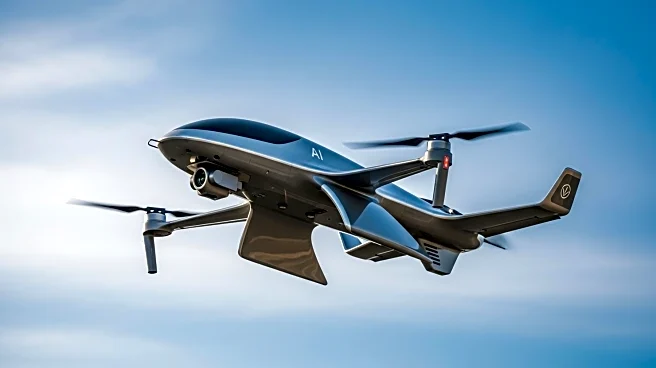What's Happening?
The aerospace industry is undergoing significant transformation as companies increasingly adopt advanced technologies such as AI, robotics, and predictive analytics. According to a study by Tata Consultancy Services, 70% of advanced air mobility companies are actively pursuing initiatives to transform their infrastructure and business models. The report anticipates that within the next five to seven years, 40% of aerospace production will operate as dark factory operations, utilizing intelligent robotics and AI. This shift is part of a broader trend where traditional manufacturing norms are being reimagined, with supply chains reconfigured for resilience and maintenance operations transitioning from cost centers to strategic value drivers.
Why It's Important?
The integration of AI and robotics in the aerospace industry represents a significant shift towards more efficient and sustainable production processes. This transformation is expected to enhance operational transparency and resource efficiency, potentially leading to increased profitability for manufacturers. As companies embrace these technologies, they may gain a competitive edge in the global market, driving innovation and setting new standards for industry practices. The move towards dark factories also highlights the growing importance of automation in reducing labor costs and improving production speed, which could have far-reaching implications for employment and economic dynamics within the sector.
What's Next?
As aerospace companies continue to pursue AI-driven initiatives, stakeholders can expect further advancements in infrastructure and business models. The transition to dark factory operations may prompt regulatory bodies to update compliance standards to address new technological challenges. Additionally, industry leaders might collaborate to develop best practices for integrating AI and robotics, ensuring that these technologies are used responsibly and effectively. The ongoing digital transformation could also lead to increased investment in research and development, fostering innovation and potentially reshaping the future of aerospace manufacturing.
Beyond the Headlines
The shift towards AI and robotics in aerospace manufacturing raises ethical and legal considerations, particularly regarding data privacy and security. As companies collect and analyze vast amounts of data, they must ensure that sensitive information is protected and used ethically. Furthermore, the transition to automated operations may impact the workforce, necessitating retraining programs to equip employees with the skills needed to work alongside advanced technologies. These developments could also influence cultural perceptions of manufacturing, as the industry moves towards more sustainable and technologically advanced practices.











